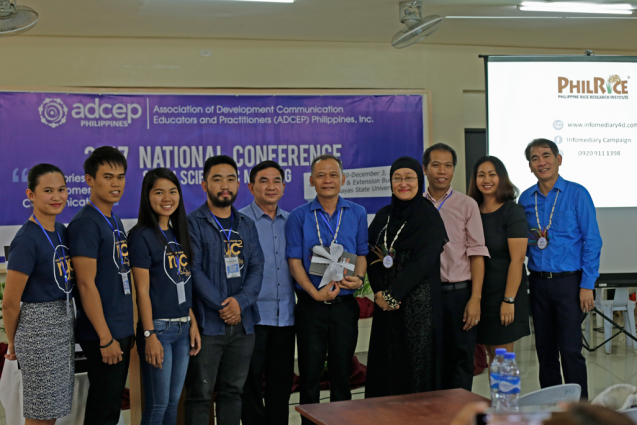PhilRice launched the book, Communicating Climate Change in the Rice Sector, at the opening program of the 2017 National Conference of the Association of Development Communication Educators and Practitioners (ADCEP), December 1.
“Rice agriculture is among the sectors most vulnerable to the adverse impacts of climate change. Yet, it appears that little is written about how to communicate climate change among rice stakeholders, especially the resource-poor farmers,” said Dr. Sailila E. Abdula, acting executive director of PhilRice.
This publication tackles key points and guidance for people involved in communicating climate change in the Philippine setting, particularly in the rice agriculture sector. It was written by Jaime A. Manalo IV, Anna Marie F. Bautista, Jayson C. Berto, Rommel T. Hallares, Fredierick M. Saludez, and Jennifer Villaflor-Mesa.
“This work is a product of several months of critical reflection buffered by our half-a-decade work in rural communities in the Philippines,” said Manalo, who also leads the Infomediary Campaign, PhilRice’s youth engagement initiative in agriculture with focus on climate-smart agriculture for rice.
The book has two parts that can be useful for high school teachers, agricultural extension workers and educators, development communication educators and practitioners, and would-be climate change communicators.
Part 1 talks about key principles on climate change communication drawn from different disciplines such as risk communication, psychology, and science communication, which are then applied in the agricultural context.
Meanwhile, Part 2 presents stories and experiences drawn from the completed project by PhilRice, Department of Education, and the CGIAR Research Program on Climate Change, Agriculture, and Food Security on integrating climate-smart rice agriculture in high school curriculum.
“It is high time to have a reference on communicating climate change particularly in the rice sector. Communication is among the quiet disciplines when it comes to climate change adaptation especially in the Philippines,” Manalo concluded.
Towards the end of the book, the authors also listed websites with impressive pool of resources on climate change.
The book was funded by the Department of Agriculture-Bureau of Agricultural Research as part of the project, Development of Agriculture TecVoc High Schools Offering Crops Production as Key Information Hubs on Climate Change-Ready Rice Production Technologies for Improved Agricultural Productivity.





